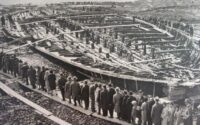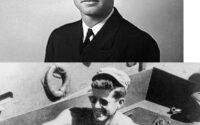HOLLYWOOD STAR AND CHRISTMAS WITHOUT THE LIGHTS: PAUL NEWMAN’S BIGGEST SECRET .m
Manhattan, 1983. The movie world was awash with glamour, but in the midst of a Christmas snowstorm, a Hollywood legend chose silence. This is not a dramatic scene from an Oscar-winning movie, but the true story, kept secret for decades, of Paul Newman and the quiet act of charity that saved a homeless shelter.
When Despair Meets an Unexpected Arrival
On Christmas Eve 1983, failure lurked at a rundown Manhattan homeless shelter. The pots and pans were empty, and a line of homeless people were waiting for a cold, hungry night. In that chaotic moment, the door swung open. It was not Santa Claus, but one of the most wanted men in the world: Paul Newman.
He didn’t bring a fancy gift bag, nor did he show up with a team of bodyguards. Just a simple navy sweater and two wooden crates filled with vegetables and flour from his own farm in Connecticut. The gesture immediately created a powerful contrast: a multi-million dollar movie star bringing produce to a charity kitchen.
The Miracle of Olive Oil and Garlic
The surprise quickly gave way to aroma. Newman, unnoticed, rushed into the kitchen. An hour later, the stale room was replaced by the scent of roasted garlic, olive oil, and rising bread. He wasn’t just a philanthropist, he was a chef, working so hard that his sweat soaked his sweater.
Newman’s act was more than just providing food. It was restoring dignity. As he placed a bowl of roasted vegetables on the table for a man named Luis, Luis burst into tears, whispering, “I used to have dinners like this with my family.” Newman did what money couldn’t do: he sat down, didn’t talk about movies or fame, but listened to Luis’s life. He made a homeless man feel “worthy.”
Actions Speak Louder Than Words
The event was a powerful testament to Newman’s philosophy, who famously said, “It’s much easier to do something than to talk about it.”
No Publicity: That night, there were no cameras, no reporters. Newman kept it completely private. He wasn’t looking for accolades, he just wanted to solve a problem.
Genuine Empathy: He didn’t just serve food; he shared his time. He cut bread for a little girl, talked to relieved mothers, and after everyone had eaten, he stayed behind to sweep the floor and wash the dishes.
The Last Message: Before leaving, he shared with a young volunteer: “Food is important. But being here with them is more important.”
This quote perfectly sums up the difference between superficial charity and true compassion. Newman did not come to do charity; he came to be part of the community.
A Silent Legacy: A Timeless Lesson
The Christmas event in 1983 is more than just a beautiful anecdote. It was the foundation for his later philosophy, culminating in the Newman’s Own food company, where all after-tax profits go to charity.
Paul Newman’s story reminds us: The greatest compassion comes not from flashy acts in front of the camera, but from a sincere presence and a quiet effort to make others feel loved and respected. It is the anonymous acts, told in whispers by those who have been helped, that truly create legends.
Have we ever wondered, if other famous people had silent secrets like Paul Newman, how much the world would change?


